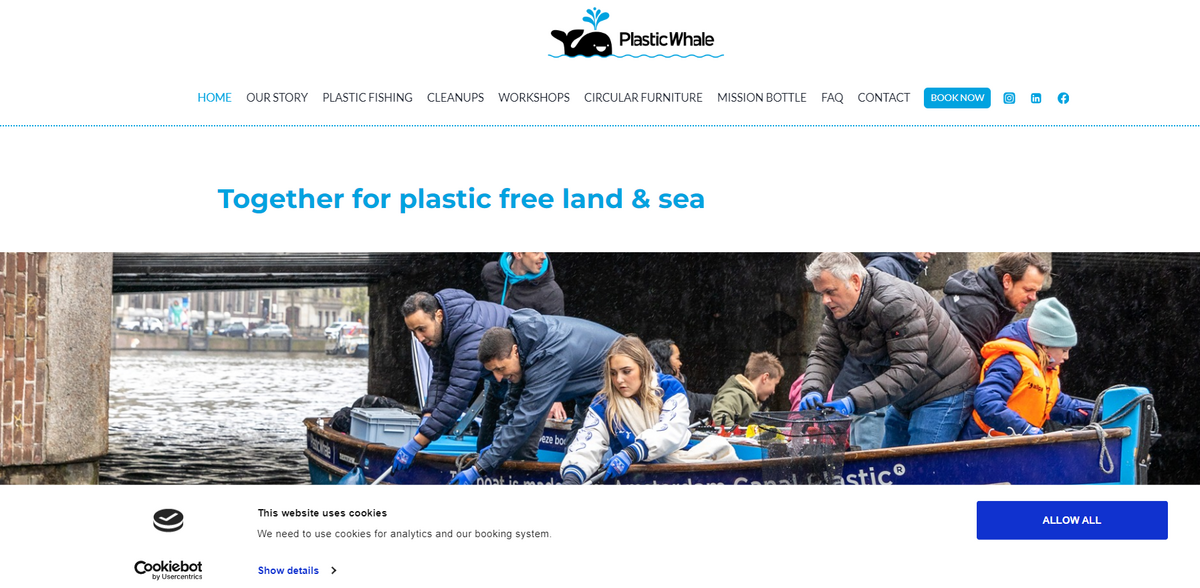What is the Plastic Whale Project?
Plastic Whale is on a mission for plastic-free land & sea. Known for events like Koningsvissen in Amsterdam at Het Scheepvaartmuseum, the project brings people together for a hands-on canal cleanup the day after King’s Day celebrations. At 12:00, participants grab their nets and head out on boats ingeniously made from Amsterdam canal plastic. It’s a fun, gezellig experience that truly makes a difference… an action that not only cleans the water but also sparks conversations and creative ideas for a better future.
Main Benefits of Joining the Plastic Whale Movement
Key highlights of the Plastic Whale project make its benefits evident:
- The event kicks off at 12:00 with nets in hand, ensuring everyone gets actively involved.
- Plastic fishing on Amsterdam’s canals transforms waste into a resource as boats made from canal plastic take center stage.
- Participants compete for prizes and engage in friendly competition, adding an element of fun to environmental action.
- An exciting reveal of a new project is always part of the day – a project that transforms PET bottles from mere waste into unexpected raw materials.
- There is a strong focus on inspiring everyone and igniting positive impact through creativity and hands-on involvement.
The Plastic Whale Workshop Experience
At the heart of the project lies the Positive Impact Workshop – a fresh approach that mixes inspiration with practical action. This workshop highlights how Corporate Social Responsibility is not just a buzzword but a chance to create meaningful change. Participants listen to an inspirational talk by Plastic Whale’s founder Marius Smit, enjoy the thrill of plastic fishing on the canals of Amsterdam (or even a beach cleanup at Amsterdam beach), and then dive into an interactive workshop led by professional workshop masters. This dynamic blend ensures that by the time the day ends, each team has a clear roadmap for positive impact.
Corporate Social Responsibility and Positive Impact
Corporate Social Responsibility (CSR) can sometimes seem a daunting concept, but the Plastic Whale approach simplifies it. A fun yet impactful workshop guides companies to envision the Positive Impact Potential (PiP) of their organizations. During this session, professionals learn that impactful change – whether it’s cleaning water bodies or turning plastic waste into economic value – doesn’t come by chance. It comes by mixing creativity with a sound business model, and, yes, a little bit of fun makes all the difference. Conversations flow naturally and every participant leaves inspired and ready to implement sustainable practices.
The Creative Transformation of Plastic Waste
The project takes pride in its motto: “Join the mission.” Plastic Whale is much more than a cleanup crew. It is a movement with a clear mission: to make waves of change by taking action against the global plastic soup. The organization values three main pillars:
- We Collect: Bringing as many people as possible together, plastic waste is amassed during events that began in the Netherlands and now aim to reach global shores.
- We Create: From plastic waste, innovative products such as boats and office furniture are born. The act of creating economic value from plastic waste shows that, with imagination, even discarded materials can fuel progress.
- We Educate: An engaging school program and various presentations and workshops extend the impact. This education inspires companies and individuals alike to join the mission, proving that every person can be a catalyst for change.
There’s no time spent lamenting the problem – the focus is always on tangible solutions, creative processes, and community engagement. The emphasis is on action rather than idle talk.
The Project Impact on Sustainable Development Goals
The innovative work of Plastic Whale aligns with several Sustainable Development Goals:
- SDG 11: Sustainable Cities and Communities – by enhancing urban water quality and encouraging community collaboration.
- SDG 12: Responsible Consumption and Production – through creative recycling and reusing plastic waste.
- SDG 13: Climate Action – by mitigating environmental damage through proactive cleanup efforts.
- SDG 14: Life Below Water – ensuring healthier waters by removing plastic debris from canals and seas.
- SDG 4: Quality Education – by teaching young people and adults about sustainability and innovative recycling.
The Global Movement for Plastic-Free Waters
The final vision of Plastic Whale extends far beyond the immediate excitement of a single cleanup event. This is a global movement driven by the belief that economic value can indeed be created from what many consider waste. The efforts in Amsterdam serve as a spark – a call to action for communities, companies, and individuals all over the world. By merging fun with serious impact, the initiative serves as an inspiration to think outside the box. Every gathered net, every collected PET bottle, and every creative product produced is a testament to the idea that positive change can start small but grow into something very big. With each event, each workshop, and each creative innovation, Plastic Whale inverses the narrative of waste into one of opportunity, progress, and a clearer, cleaner future.


















